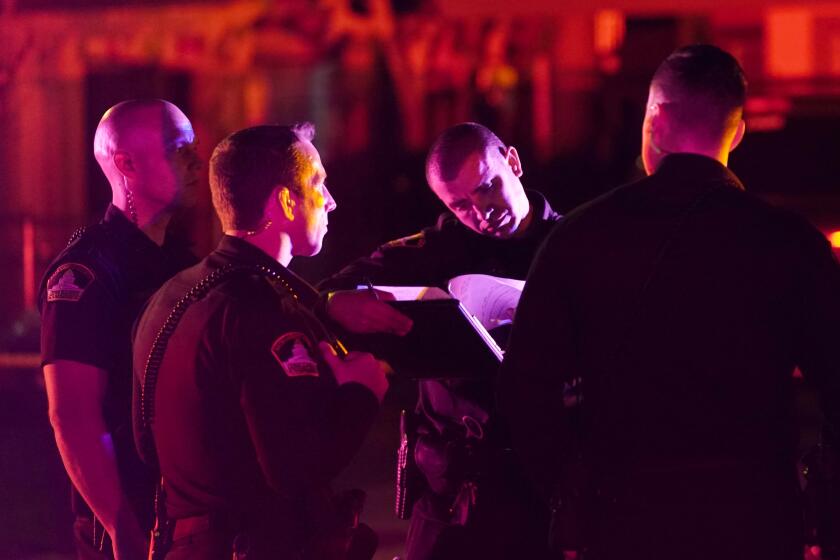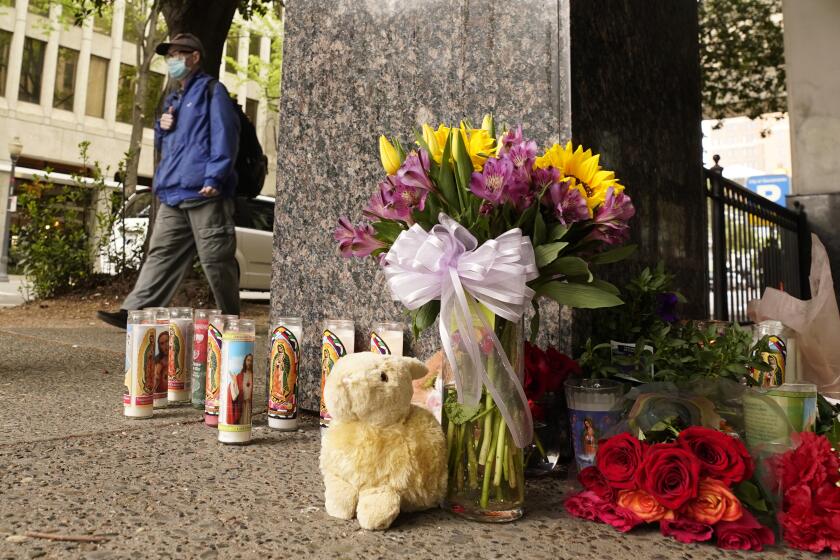Victims of violence want California courts to prioritize child safety in custody cases
SACRAMENTO — In late February, a Sacramento man shot and killed his three young daughters during a court-ordered supervised visit at a church that their mother had asked a judge not to approve.
A Los Angeles man is serving 25 years to life in prison for suffocating his 5-year-old son to death in his car seat in 2017, a move he admitted was to punish his estranged wife, the boy’s mother, who was fighting for full custody.
Earlier this month, a 6-year-old boy and his mother were killed at their Baldwin Park home in a shooting that police say was connected to a domestic dispute with her boyfriend.
In the aftermath of these and other tragedies, domestic abuse survivors — including the mothers of slain children — are pushing for reform of the California family court system when it comes to custody and visitation proceedings. In numerous cases, they say, judges and mediators dismissed their requests and ignored warning signs about violent spouses and guardians.
Earlier this week, survivors of violent crimes stood alongside state Sen. Susan Rubio (D-Baldwin Park) outside the Sacramento Capitol to call for the courts to better recognize signs of abuse and to err on the side of the child’s safety when it comes to custody deals.
Currently, the court system is too focused on an even balance of custody with both parents, regardless of a history of one parent’s — usually the father’s — domestic abuse and violence, Rubio said.
“The fact is victims and their children may be at greater danger during separation and when they have restraining orders,” Rubio said at a press conference Monday. “Their abusers are angry and will do anything to harm them, ruin them, assault them, kill them and go as far as killing their own children in retaliation. The system failed them.”
Woman told court her boyfriend was dangerous before he killed 4 during a supervised visit with their children at a Sacramento-area church.
A bill by Rubio making its way through the Legislature would mandate training for judges and other mediators to spot domestic and child abuse and would ban forced family reunification services in some cases. The bill would also allow California to receive up to $25 million in new federal funding to “prioritize child safety” in divorce and custody cases.
SB 616 is known as “Piqui’s Law,” in honor of Aramazd Andressian Jr., the 5-year-old affectionately known as Piqui who was killed by his father in 2017.
His mother, Ana Estevez, spoke through tears alongside Rubio in Sacramento, and said the court denied her request for sole custody of her son because of “the belief that custody should be shared equally,” and therefore she was unable to protect him.
“During his confession, he admitted he hated me and wanted to hurt me. And he did. He hurt me in the deepest and most inhumane way possible. He took the one thing that mattered the most to me in this world — my only child,” Estevez said of her ex-husband. “Being a survivor of a violent crime also comes with a life sentence. For me, that sentence is having to live my life without my son.”
Since 2008, there have been 851 known cases in the U.S. of children killed by a parent or guardian during a divorce or separation, according to the Center for Judicial Excellence, a nonprofit organization in San Rafael, Calif., that advocates for children involved in the family court system.
Kathleen Russell, executive director of the Center for Judicial Excellence, said many cases of parents killing their children during divorce or custody hearings can be prevented. She is advocating for a focus on reform and accountability of judges, as has been pushed in recent years for police.
She pointed to a report in 2019 by the California state auditor that showed various failures of the Commission on Judicial Performance, the only oversight agency in charge of investigating complaints about judges and courtroom handlings.
Accountability is especially important, Russell said, as women in domestic violence situations are often financially abused — meaning they are less likely to be able to obtain a lawyer during custody hearings.
“The courts are simply not recognizing the dangers of domestic violence and child abuse that are so common, and they have this immunity where they can pretty much do whatever they want and not be held accountable,” Russell said. “Children in family court are essentially treated like marital property, not as human beings. Kids have a right to be safe in their home and to grow up into adulthood.”
Abuse of women often leads perpetrators to engage in gun violence. The link is strong, but our will to stop abusers is not.
Rubio has also called for better enforcement of restraining orders and tighter rules for child visitation, saying the system has failed people like Ileana Gutierrez, whose daughters, ages 9, 10 and 13, were gunned down by their father in Sacramento, along with the court-appointed supervisor assigned to oversee their visits.
The case shed a light on the gaps in enforcement, as David Mora — who killed himself after the attack — was able to maintain visits with his children despite a history of documented violence and mental health problems. He was also able to acquire an AR-15-style rifle, which he used to kill his daughters, despite gun restrictions for those with restraining orders.
Gutierrez had filed a restraining order against Mora, which was granted, but the court denied her request for the same for her children.
She stood alongside Rubio outside the Capitol on Monday, crying and wringing her hands, wearing a T-shirt depicting a picture of her smiling daughters, Samia, Samantha and Samarah.
“This mother will never see her children graduate from high school, go off to college, fall in love and walk down the aisle. She was robbed,” Rubio said of Gutierrez. “I’m not just sad, I am angry. I am really angry that our children continue to die at the hands of their abusers.”
More to Read
Sign up for Essential California
The most important California stories and recommendations in your inbox every morning.
You may occasionally receive promotional content from the Los Angeles Times.













